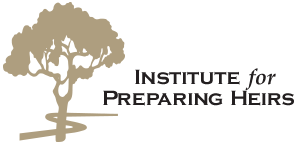The Role of Beneficiary: New Thinking Shows Great Promise

Educated beneficiaries are a boon to trustees. But the learning needs to begin early, and trusted advisors can play an important role.
Litigating for a larger slice of a smaller pie
Angered by what they considered to be “uneven distributions” among the 15 beneficiaries of a large trust, six of the beneficiaries banded together to share the legal cost of either changing the trust, or changing the trustees. They had seen an ad from a law firm claiming a high success rate in “getting trust beneficiaries what they want and need.” Agreeing to share the costs of litigation, and appearing before the Court regulating the trust, they pleaded their case. Following their pleas, the judge issued an order for the trust to pay their legal costs, and for the trustee to increase their distributions by 10 percent. However, attorney fees for both the beneficiaries and the trustee had cost the trust 20 percent of its value. Everyone’s distributions were lowered.
The above true story is from a new book from the Institute for Preparing Heirs, Executors, Trustees & Beneficiaries: Honoring The Intent, The Law & Emerging Trends. This story makes the point that it’s seldom in the best interest of the beneficiaries, trustees and trust creator when litigation seems the best, and only, course of action when beneficiaries feel unfairly treated.
A July 29, 2016, article in the New York Times by Paul Sullivan, “How a Will Treating Children Differently Can Still Be Fair,” points to today’s proliferation of litigation because heirs are feeling more and more entitled. Mr. Sullivan writes, “All these problems can be minimized, if not fixed, with a conversation.” He quotes William D. Zabel, a founding partner of the law firm Schulte Roth & Zabel, “My rule is the sooner the better and tell them as much as they need to understand what the family wealth is about. ”
But is litigation really preventable? Can beneficiaries be educated to be good beneficiaries and ultimately, good trustees? We believe the answer is yes! And, what can trust creators, with the help of their professional advisors, do to avoid future litigation and/or fractures among beneficiaries?
New thinking shows great promise
The authors of Executors, Trustees & Beneficiaries, Vic Preisser and Vanessa Terzian, make the point that while parents may devote hundreds of legal and accounting hours preparing their assets for transfer, they seldom spend the same amount of time preparing their heirs to receive and manage those same assets—the solid foundation for becoming good beneficiaries.
The authors wisely write: “As experience accumulates, the more forward-thinking estate planners are realizing the importance of better preparation of heirs as they progressively assume their inheritances. Modern thinking embraces a more extended period of preparation for the beneficiaries of trusts and other estate assets. The notion of the estate/trust responsibility ‘landing’ on the heirs at the time of the passing of a parent or grantor is simply too traumatic . . . assets lost, family unity lost, sometimes permanently. Confused thinking, gear shifting of emotions, and a sense of massive readjustment is an environment of tumult . . . and no one thinks their best during turmoil!”
The new role of the Trusted Family Advisor®
By definition, Trusted Family Advisors®—financial advisors and estate attorneys—have formed a relationship with the entire client family before the estate transition, and have taken the client/advisor relationship to a new level beyond investment management and estate planning.
The Trusted Family Advisor® offers high-net worth families inheritance planning strategies and tools aimed at preparing and unifying the entire family before wealth transfer. The Trusted Family Advisor® understands the intentions of the trust creator (as articulated in the Family Wealth Mission Statement) and can offer guidance (e.g. holding regular family meetings) whereby beneficiaries are far more likely to gain an appreciation for the intentions of the wealth creator—and ultimately the benefits that come with a trust. And, these forward-thinking advisors are more likely to retain the beneficiaries and the assets post-wealth transfer.
What else the Trusted Family Advisor® can do for high-net worth client families to prepare heirs:
- Encourage their best client families to involve future beneficiaries in the estate planning process early on to help ensure the trust creators’ intentions are honored and their assets and legacy survive future generations
- Offer to meet with the children to discuss the family’s investment and estate plan, not necessarily the dollar amount of the assets
- Offer to provide financial mentoring based upon the needs of the client’s children
- Suggest a family giving program where the children take an active role
Advisors benefit from training, too
Just like beneficiaries, advisors need new training and new tools to engage the parents, typically the clients, who will then engage their children in the inheritance conversations. These discussions serve to reinforce that not only does the money matter, such as preservation and management of assets, but the family matters as well, including family legacy and values that hold families together.
The emergence of trustee teams
New thinking also suggests that beneficiaries benefit from a combination of skills, both professional and mentoring. The authors write: “The professional advisors manage the traditional aspects of the trust such as investing, reporting, legal interpretations . . . while the mentoring member/trustee keeps the family’s values and intent in mind and does his/her best to prepare the beneficiaries to handle their received assets in a manner that is comfortable to them and helps them fulfill their individual life and career goals.” A mentor can be a family friend, relative, and even their Trusted Family Advisor®.
Sound advice advisors can offer beneficiaries
To become a competent beneficiary, the book offers several key factors that have to do with knowledge, spirit, and intentions:
- Understand the provisions and limitations of the trust
- Have an awareness of the founder’s intentions
- Have a sense/spirit of gratitude towards the trust and its founder
- Gain an appreciation for the responsibilities of the trustee
- Understand the need for good communication with the trustee
- Exhibit flexibility as laws, needs, and regulations change
- Maintain continuing relations with other beneficiaries of the trust
The book also contains a series of helpful self-checklists that individuals can use to better understand the knowledge, skills, qualifications and even temperament required to best serve as executor, trustee and beneficiary.
Find out more about the Institute’s advisor workshops.

